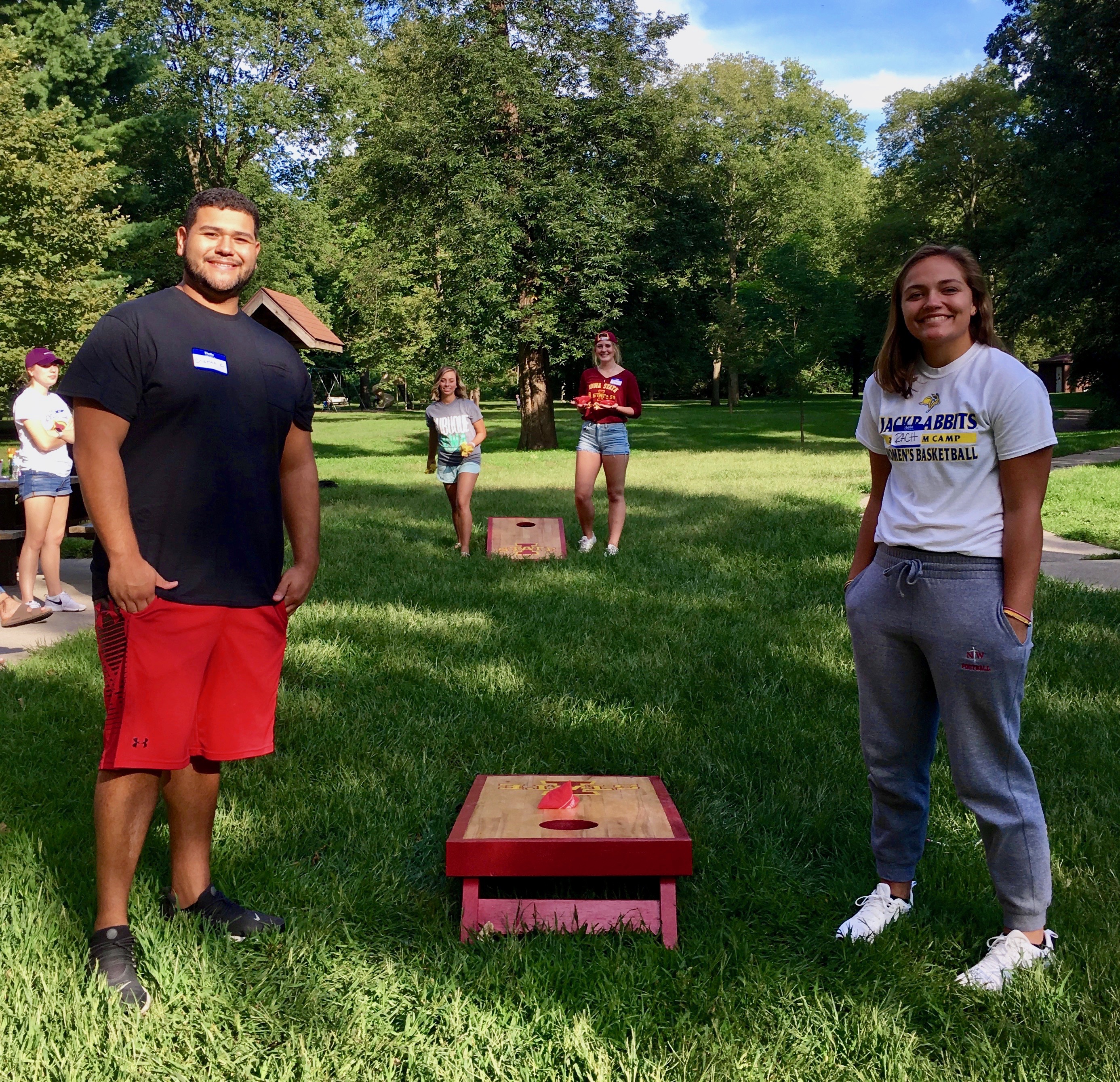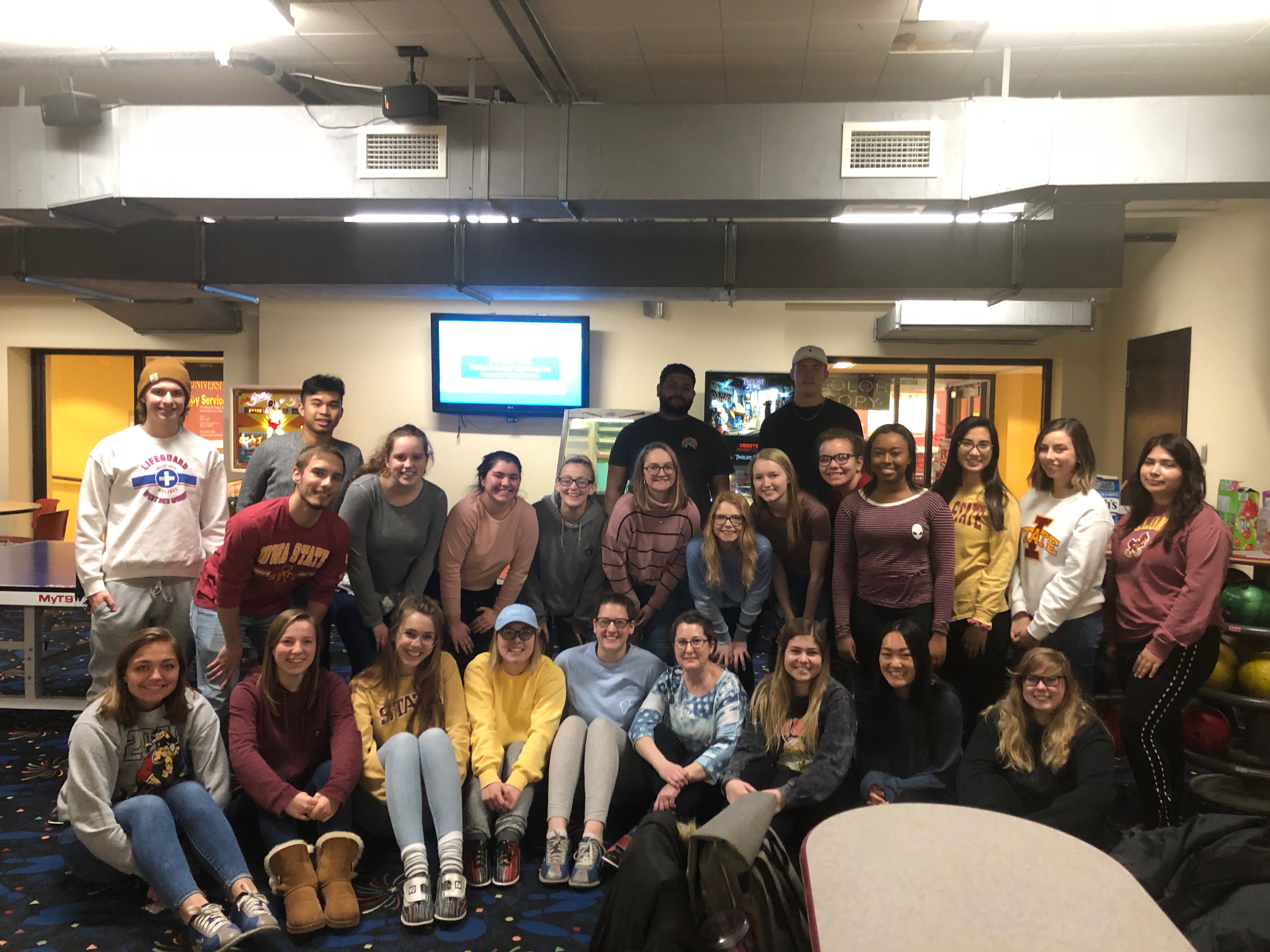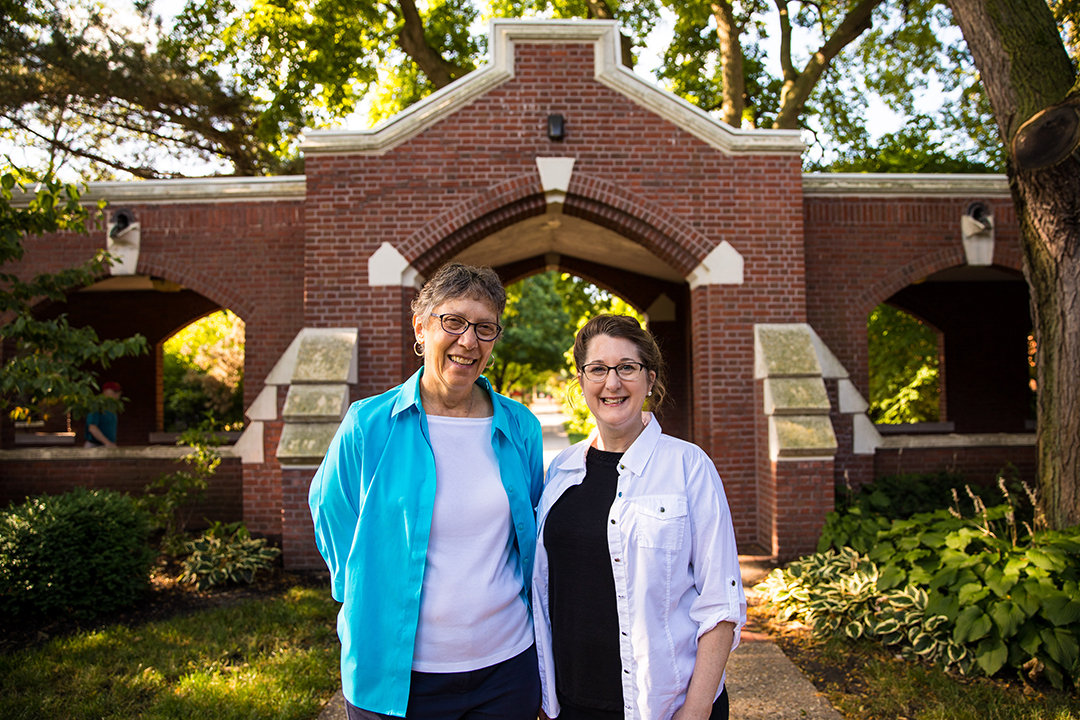Emotions run the gamut prior to a student’s freshman year of college. There’s excitement about meeting new friends, living independently and beginning new academic endeavors. But wrapped up in all the euphoria is a tangle of other emotions like anxiety, fear and doubt. Those latter feelings, left unchecked, can challenge the mental health of young college students.
At Iowa State, the Psychology Freshmen Learning Community gives freshmen psychology majors an opportunity to learn and socialize with each other through a classroom curriculum that focuses on happiness and well-being, with an emphasis on helping others. In the short term, students learn valuable coping skills as they transition to college, giving them tools to address their own mental health. Long term, they discover – sometimes by accident – that true happiness stems from service to others.
How it all began
The Psychology Freshmen Learning Community was established in the fall of 2010 by former psychology faculty member Rhonda Bonett and Carolyn Cutrona, who was then chair of the psychology department; today she is associate dean of the Graduate College and maintains faculty status in psychology. Cutrona was concerned about how freshmen were faring academically and socially when placed in large introductory psychology courses with hundreds of other students.
According to statistics gathered by Iowa State, freshmen who entered the university in 2012—and who were not enrolled in a learning community—had a four-year graduation rate of 46.2%. The rate for those freshmen in the Psychology Freshmen Learning Community was 73.9%.
Armed with research that shows students who feel connected to those around them are more likely to stay in college, Cutrona enlisted the help of Karen Scheel, associate teaching professor in psychology, to help her expand the learning community. It was a task for which both were well-suited.
Skilled scholars
Cutrona joined Iowa State’s Department of Psychology in 1992. Her research focuses on the predictors of and challenges to the mental health of parents in African American families. More recently, she has examined the experiences of African American women as they approach retirement, pinpointing the factors that help them thrive.
Teaching and advising students has been the focus of Scheel’s work at Iowa State since joining the psychology department in 2007. She was trained as a counseling psychologist, and is committed to creating a positive learning experience for all students, freshmen through doctoral candidates.
Cutrona and Scheel agree that the number one goal of the learning community is to help students feel connected to Iowa State, the psychology department and to each other.
“The students love to know that when they begin a new psychology class, there are likely to be students they know from their freshmen learning community,” Cutrona said. “Having someone to sit with, talk to and study with makes college a much more enjoyable experience.”
Transfer students also have the opportunity to connect with their peers through the Psychology Transfer Learning Community. About 20 students join this group annually to better prepare for their psychology careers. This learning community is led by Kristin Towers, an academic advisor in psychology.

In demand
Since its inception in 2010, the learning community continues to grow. Initially, there was one section of about 20 students, led by Cutrona. A few years later, a second section was added and taught by Scheel. Since then, a total of about 50 students participate in the learning community each year. This fall, there’s a waiting list to get in. But bigger isn’t necessarily better.
“Having someone to sit with, talk to and study with makes college a much more enjoyable experience.”
“We like to keep sections a small size so it has a community feel,” Scheel said.
That cozy, close-knit vibe is what attracted West Des Moines native Anna Mattern (’21 psychology, criminal justice) to the Psychology Freshmen Learning Community.
“Everything seemed so overwhelming, but the idea of a learning community stuck out to me,” Mattern said. “It was a group of people sharing my major, in the same classes as me, and that gave me a lot of peace of mind.”
Natalie Teclaw (’20 criminal justice, sociology, psychology), Alexandria, Minnesota, also joined the learning community her freshman year. Teclaw’s first-year experience was so positive, she became a peer mentor her junior year. Her goal was to help other freshmen transition smoothly to college.
“Seeing the learning community from both the freshman and mentor perspective showed me just how big this opportunity is, and how much one can really take away from it,” Teclaw said.
Fall semester: Preparation for service learning
While connecting freshmen psychology students with each other is the overarching goal of the learning community, exploring the field of psychology and its career options also is key.
“Everything seemed so overwhelming, but the idea of a learning community stuck out to me. It was a group of people sharing my major, in the same classes as me, and that gave me a lot of peace of mind.”
From the beginning, Cutrona and Scheel wanted to expose students to positive psychology, a relatively new field of study that examines the positive aspects of humanity. As a result, the fall semester theme for both sections is the psychology of happiness and well-being. This is also when students plan their academic schedules with Cutrona and Scheel, who act as their academic advisors. The students learn about various university resources, such as counseling and academic services as well as student loan education. Rounding out the semester, they delve into the concepts of happiness and well-being, and prepare for the spring semester’s service-learning component.
The first semester’s instruction comes from the book, “U Thrive: How to Succeed in College (and Life)” by authors Dan Lerner and Alan Schlechter. Each week, the students write a short journal entry about the most important lesson they learned from the assigned reading and how it applies to their lives.
“They are experimenting with different lessons from psychology that they put to use themselves,” Scheel said.
Spring semester: Serving others
During spring semester, Cutrona and Scheel take the students in slightly different directions, though both still connect the concept of happiness and well-being to service learning.
Cutrona’s students study how poverty affects children and how psychology can prevent or lessen those impacts.
“I chose that topic in 2010 because I thought the national dialogue was hostile to low-income people, and I did not want Iowa State students to accept the tendency to blame the victims of poverty,” she said.
In addition to class time, the students split up into teams and accompany Cutrona on weekly visits to the Emergency Residence Project, a homelessness prevention agency in Ames. There, the college students participate in art and crafts activities with the youngsters on site, usually wrapping up their time together with a walk to the nearby Dairy Queen for ice cream.
“The greatest value of this experience for the freshmen is to develop awareness that people in poverty are just like everybody else. They have simply fallen on hard times, most often because of a health crisis or job loss,” Cutrona said. “This is a life-changing experience for the students, and many of them continue to do volunteer work throughout their college career and beyond.”
Scheel’s students continue studying happiness and well-being throughout spring semester, with an added emphasis on holistic health. Service learning is also implemented, but Scheel’s students pick the organizations they wish to help. To help them choose, students complete an inventory assessment of their character strengths, and Scheel asks them to tailor their service learning to those strengths.
“Becoming aware of what lights their own fire is part of the purpose of this activity,” Scheel said.
Students have volunteered for a variety of organizations, such as Iowa State’s annual blood drive, the Alpha Phi Omega service fraternity, Study Buddies program and animal shelters. At the end of the semester, the students write a paper reflecting on what they learned by serving others.
“For some students, it becomes a career objective to go into nonprofit work. Most find it quite rewarding,” Scheel said.
“This is a life-changing experience for the students, and many of them continue to do volunteer work throughout their college career and beyond.”

Lasting impact
After the Psychology Freshmen Learning Community wraps up each spring, Cutrona and Scheel hope the students have a deeper understanding of their psychology major and of the positive ways they can impact others.
“I want our students to understand the critical contributions that psychology can make to lessen the impact of poverty on children—Head Start programs, job training for parents, self-efficacy coaching in elementary schools and home visits are some examples,” Cutrona said.
Scheel echoes Cutrona’s wishes for the students, hoping they recognize what they can offer.
“I hope they leave with a sense that they can contribute from day one as psychology majors, that they have gifts to offer, and that doing so is oftentimes fun and rewarding,” Scheel said.
Mattern and Teclaw agree that their experiences with the Psychology Freshmen Learning Community will be long lasting.
“The biggest thing I took away from it all is that the little things in life can have such a vast impact,” Mattern said. “Something as simple as going for a 15-minute walk or taking 60 seconds to just sit and breathe can be beneficial. This is something I’ll always remember as life throws me inevitable curve balls.”
Teclaw also is grateful for the tools she took from the learning community.
“Being able to take care of my physical, emotional and mental health is something I did not think about a lot before coming to college,” she said. “Now I have the tools to keep myself and others happy and healthy in many different ways.”
